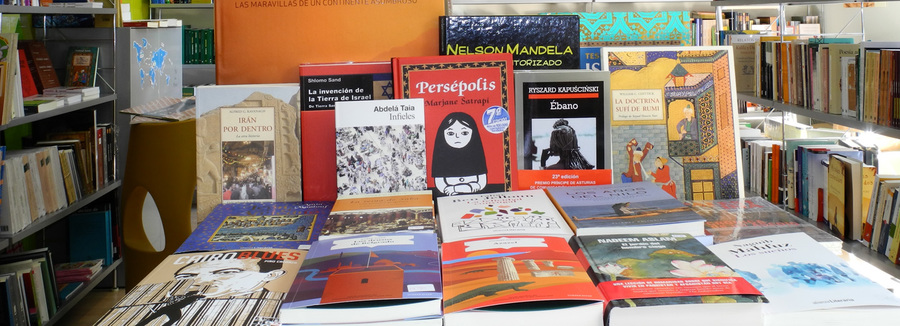Books and publications
Index / Activities / Books and publications / The Balqís-Casa Árabe Reading Club is back
The Balqís-Casa Árabe Reading Club is back
From March 14, 2018 until May 16, 2018Wednesdays at 7:30 p.m. Check schedules.
MADRID
Casa Árabe headquarters / Hall of Columns (at Calle Alcalá, 62) Basement Level
Wednesdays at 7:30 p.m. Check schedules.
Free of charge after registering to participate.
Those interested must sign up at least ten days in advance of each session by writing to libreriacasaarabe@gmail.com
In Spanish.
Casa Árabe’s Balqís Bookstore will be holding new sessions of its
Reading Club, which will be taking place on Wednesdays at 7:30 p.m.
The Reading Club is a space to help the public learn more about Arab literature and thought. At the Balqís-Casa Árabe Reading Club, both classical works and contemporary authors will be read and discussed, as well as the latest publications in the Arabic language.
To attend the workshop, you need to have read the proposed book before each session. The Balqís bookshop will be giving a 10% discounts on the price of the books chosen for this reading club. Those interested must sign up at least ten days in advance of each session by writing to libreriacasaarabe@gmail.com
To attend the workshop, you need to have read the proposed book before each session. The Balqís bookshop will be giving a 10% discounts on the price of the books chosen for this reading club. Those interested must sign up at least ten days in advance of each session by writing to libreriacasaarabe@gmail.com
-
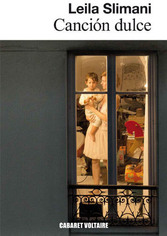
Sweet Song by Leila Slimani
April 04, 20187:30 p.m.MADRIDCasa Árabe headquarters / Hall of Columns (at Calle Alcalá, 62) Basement Level 7:30 p.m. Free entry after registering.Those interested must sign up at least ten days in advance of each session by writing to libreriacasaarabe@gmail.com
In Spanish.First session of the year 2018 edition of the Reading Club, with a work published by Cabaret Voltaire. It will be introduced by Malika Embarek.Canción dulce (Sweet Song, Madrid, published by Cabaret Voltaire, 2017) is the second novel by Leila Slimani (Rabat, 1981), earning her the Goncourt Prize in 2016. Despite its harsh plot, the murder of two children by the babysitter who takes care of them, and the fact that the dramatic outcome is known from the very beginning, creating a high level of complicity with the narrator, the novel truly draws readers in. In a masterful style, the book explores the psychological depth of the characters, the descriptions of the city where it is set, Paris, the poverty and differences between social classes, women’s difficulty fitting work and family life in with each other, loneliness, frustration, resentment and madness, the contradictions in today’s world and the universal nature of pain. And it does so in an objective way, allowing readers to make their own interpretations.
Malika Embarek López
Holder of a degree in Spanish Philology from the Université Mohamed V in Rabat Embarek López is a technical translator and official translator of French, though her true calling is literary translation of texts which are culturally mixed, like her own life path. With approximately 70 translated works, she mainly devotes her time to translating North African literature written in French (Tahar Ben Jelloun, Edmond Amran El Maleh, Abdelwahab Meddeb, Mouloud Feraoun, Boualem Sansal, Haim Zafrani and Leila Slimani, as well as others). In collaboration with other translators, she has also translated works by Moroccan authors who write in Arabic (Mohamed Chukri, Abdellah Laroui and Rachid Nini). Her latest published translations include: Sexo y mentiras (Sex and Lies) and Canción dulce (Sweet Song), by Leila Slimani, Madrid, Cabaret Voltaire (2018 and 2017); Zoco Chico, by Mohamed Chukri, in collaboration with Karima Hajjaj, (Madrid, Cabaret Voltaire, 2015); El islam que da miedo (On the Islam That Causes Fear), by Tahar Ben Jelloun (Madrid, Alianza Editorial, 2015). In terms of teaching experience, she gives workshops on literary translation. In November of 2015, she was given the International Gerardo de Cremona Translation Award, and in 2017, Spain’s National Award for the full body of work by a Translator.
In order to attend the workshop, you must have read the book to be analyzed before each session. The Balqís bookshop will give a 10% discount on the price of the books that have been chosen for the Reading Club.
-
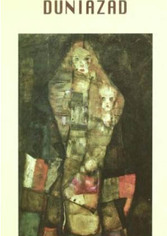
Duniazad, by May Tilmisani
April 11, 20187:30 p.m.MADRIDCasa Árabe headquarters / Hall of Columns (at Calle Alcalá, 62) Basement Level 7:30 p.m. Free entry after registering.Those interested must sign up at least ten days in advance of each session by writing to libreriacasaarabe@gmail.com
In Spanish.Gonzalo Fernández Parrilla will be guiding this second session of the Balqís Reading Club at Casa Árabe’s bookstore.Duniazad is a woman’s name of Persian origin. Duniazad is the younger sister of the mythical Scheherazade, the clever storyteller from The Arabian Nights. Duniazad was also the name of a well-known movie theater in Algiers. Duniazad is, too, a name given to many girls born in in Egypt during the last decade of the twentieth century. However, Duniazad, by Egyptian writer May Tilmisani, is also the story of something lost.
Gonzalo Fernández Parrilla is a professor of Arab and Islamic Studies at the Universidad Autónoma de Madrid. He is the author of La literatura marroquí contemporánea (Contemporary Moroccan Literature), and editor of works such as Orientalismo, exotismo y traducción (Orientalism, Exoticism and Translation), as well as the translator, with Malika Embarek, of Diario de un ilegal (Diary of an Illegal), by Moroccan writer Rachid Nini, and of Marruecos, Sáhara… (Diarios 1974-1981) [Morocco, Sahara... (Diaries of 1974-1981)] by another Moroccan writer, Abdallah Laroui.
In order to attend the workshop, you must have read the book to be analyzed before each session. The Balqís bookshop will be providing a 10% discount off the price of the books that have been chosen for the Reading Club.
-
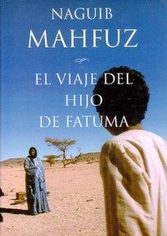
"The Journey of Ibn Fattouma" by Naguib Mahfouz
May 08, 20187:30 p.m.MADRIDCasa Árabe headquarters / Hall of Columns (at Calle Alcalá, 62) Basement Level 7:30 p.m. Free entry after registering.Those interested must sign up at least ten days in advance of each session by writing to libreriacasaarabe@gmail.com
In Spanish.Third session of the Balqís / Casa Árabe Reading Club devoted to this work by Naguib Mahfouz, to be directed by philologist Marek Brieška.The Journey of Ibn Fattouma is one of the most unusual novels by Egyptian writer and winner of the Nobel Prize for Literature, Naguib Mahfouz. Unlike his other novels (with the exception of his neo-Pharaonic period), which usually take place in Cairo or Alexandria, The Journey of Ibn Fattouma represents a divergence both formally and stylistically. The main character is from an anonymous Islamic country, and we do not know at what point in that country’s history the plot occurs. Following the tradition of form in medieval literature known as the rihla (journey), Mahfouz recreates landscapes and political systems not only by crossing the dimension of space, but also by going beyond the dimension of time. He invites readers to travel through mankind’s history by looking at its (often) failed efforts to create peace on Earth. Sometimes very precarious and dangerous circumstances will make Ibn Fattouma and the reader think just how far we have gone to provide responses to the main challenges in life.
With a bachelor’s degree in Eastern Philology from the University of Matej Bell in Slovakia, Marek Brieška is a translator and diplomat. In 2009, he presented his doctoral thesis after having lived and researched in Egypt for five years. He was also stationed in Iran. Up to now, he has translated works of modern and contemporary Arab literature, including works by Egyptians Naguib Mahfouz and Gamal al-Ghitani, Morocco’s Mohammed Chukri and famous Sudanese writer T. Salih. He is now about to have his seventh translation published, a work by Iraqi writer Hassan Blasim.
Event information sheet
-
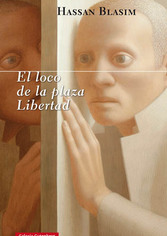
"The Madman of Freedom Square" by Hassan Blasim
May 16, 20187:30 p.m.MADRIDCasa Árabe headquarters / Hall of Columns (at Calle Alcalá, 62) Basement Level 7:30 p.m. Free entry after registering.Those interested must sign up at least ten days in advance of each session by writing to libreriacasaarabe@gmail.comIn Spanish.Writer and Hispanist Abdul Hadi Sadoun will be directing the fourth session of the Casa Árabe Reading Club.The Madman of Freedom Square is the first volume of short stories by Hassan Blasim, considered for many years to be one of the finest contemporary Arab fiction writers. The book mixes the phantasmagorical with the starkly real, in a style that immerses readers within the individual fates of the people who lived through the institutionalized paranoia of Saddam Hussein’s regime, the Iraq war and the later American occupation, of those who had to emigrate and endure human trafficking and the nightmare of trying to build a new life in Europe. There are 11 tales which come together to form a map of real life stories in difficult times. It is a necessary book for discovering the finest storytelling in Arabic today.
Abdul Hadi Sadoun (Baghdad, 1968). A writer and Hispanist, currently residing in Madrid, Sadoun has a PhD in Philosophy and Letters from the Universidad Autónoma de Madrid and is the author of a long list of books in both Arabic and Spanish. Some of his most notable publications in Spanish include: Escribir en cuneiforme (Writing in Cuneiform, Caracas, 2006), Plagios familiares (Family Plagiarism, Tenerife, 2008), Pájaro en la boca y otros poemas (A Bird in the Mouth and Other Poems, Havana, 2009), Siempre Todavía (Forever Always, Zaragoza, 2010) Campos del extraño (Fields of the Strange, Granada, 2011), Memorias de un perro iraquí (Memoirs of an Iraqi Dog, Barcelona, 2016), and Todos escriben sobre el amor menos tú (Everyone Writes About Love But You, 2018). His literary work has been translated into several language, including English, French, Italian and Farsi. His poetic work has received many different acknowledgments including the second Antonio Machado International Scholarship (Soria, Spain, 2009), Distinguished Guest of the city of Salamanca (2016) and the Tenth Distinction for Poets from Other Worlds (published by Fondo Poético Internacional, 2016).
Event information sheet

